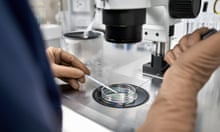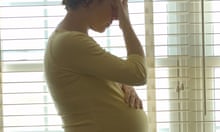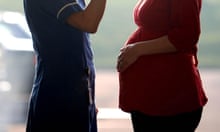Five pregnant women wearing “I Am Mary” T-shirts in memory of the nurse Mary Agyapong protested in Parliament Square on Wednesday after figures revealed nearly 1,000 pregnant NHS staff were still working in patient-facing roles.
Despite evidence revealing that pregnant women may be at an increased risk of severe disease and losing their baby if they contract Covid, 984 pregnant staff in 25 trusts across the UK continue to work in frontline roles, a request under freedom of information laws by the campaign group Pregnant Then Screwed has revealed.
The UK’s Joint Committee on Vaccination and Immunisation (JCVI) has given the green light for pregnant women in the UK to receive the Pfizer or Moderna Covid vaccine after data from the US showed about 90,000 pregnant women had been vaccinated without any safety concerns.
But Ernest Boateng, whose wife, Mary Agyapong, died in April 2020 after contracting Covid, days after giving birth to their baby daughter, said it was “not right” that a year on, pregnant women still did not feel safe at work.
“My beautiful Mary died a year ago,” he said. “It has left me without a wife and my children without a mother.”
Research from the campaign group Pregnant Then Screwed, which collected data from almost 17,000 pregnant women and new mothers (3,623 of whom were pregnant) in March, reveals that 57% of those working outside the home say they do not feel safe at work, while 52% say their employer has not done or is not following a risk assessment despite the legal requirement to do so.
It found that of the third of pregnant women working outside the home, three-quarters of pregnant women said they could not socially distance at work. Just 4% of all pregnant women had been suspended from work on full pay on safety grounds.
“The government must do more to ensure pregnant women, particularly black pregnant women, are protected from contracting Covid-19,” said Boateng. “I don’t want another family to have to go through what mine has been through these last 12 months.”
Joeli Brearley, the CEO of Pregnant Then Screwed, said Agyapong’s death had “cut deep” and campaigners and expectant parents had hoped her death would lead to a change in the guidance for pregnant women to ensure others were better protected from Covid-19.
“But no such guidance was forthcoming despite pressure from our charity and other groups,” she said. “It took the government nine months to issue specific guidance for pregnant women in the workplace and employers are still not adhering to it. Ultimately, this lack of adequate protection, and lack of enforcement, is putting the lives of these women and their babies at risk.”
According to the Royal College of Obstetricians and Gynaecologists UK studies suggest pregnant women are no more likely to catch Covid than other groups. But while the majority who do get the virus have no symptoms or mild symptoms, pregnant women may be at increased risk of having severe disease. Pregnant women who did get symptomatic Covid-19 infection were two to three times more likely to give birth to their baby prematurely, according to the JCVI.
“Pregnant Then Screwed continues to call on the government to ensure all employers suspend pregnant women on full pay if they cannot keep them 2 metres away from other people at all times,” said Brearley.









